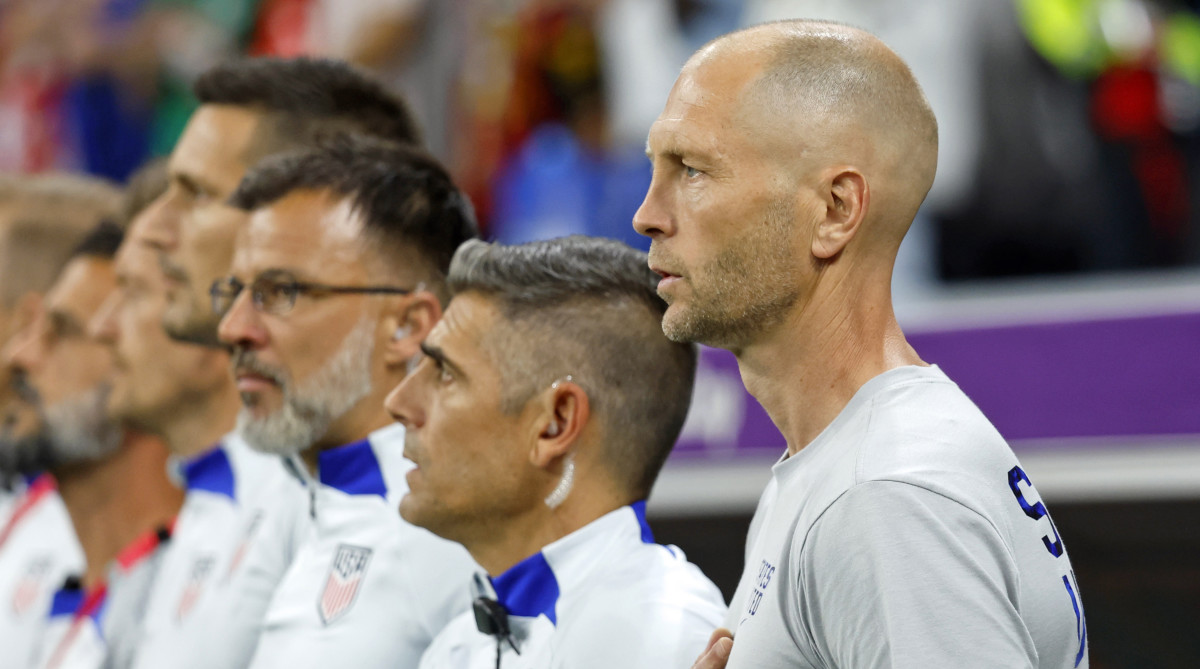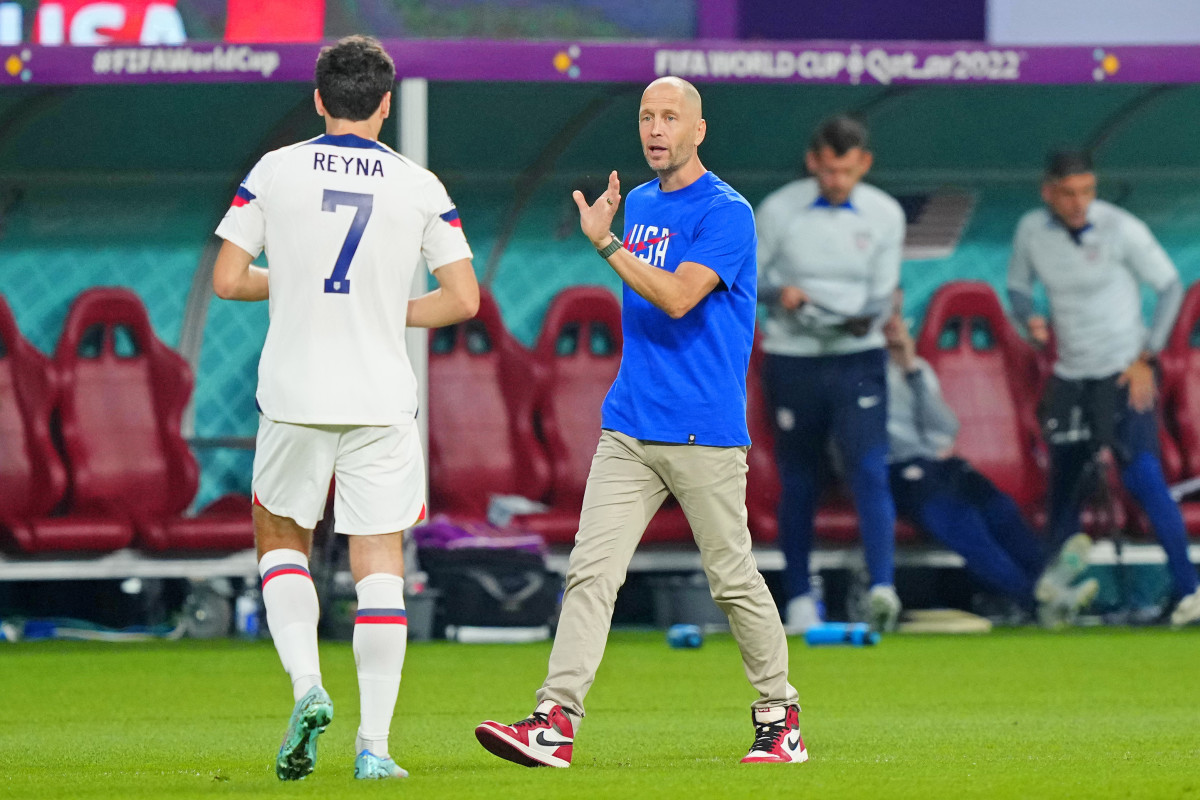Managerial Chaos Sends USMNT Into Uncharted Territory
One of the biggest decisions in American soccer history—the hiring of the men’s national team coach ahead of the 2026 World Cup that’ll be played primarily in the U.S.—has been thrown into chaos by that most grassroots of soccer problems: angry parents.
Gregg Berhalter’s bizarre speech at a leadership conference concerning the team’s handling of an unhappy player during the recent World Cup, later identified as Gio Reyna, has exploded into a feud between two of the country’s most prominent soccer families, an independent investigation into Berhalter’s behavior while in college, the potential blackmail or harassment of other U.S. Soccer Federation personnel and an apparent delay in determining the next USMNT manager.
“Obviously, this is not a positive time for soccer in this country and for our men’s national team,” USSF president Cindy Parlow Cone said during a Wednesday conference call. “It’s a tough time for the families involved, and I’m just hopeful that we can find a resolution to this quickly and move forward with our men’s team as well as for U.S. Soccer in general.”

“Quickly” may already be out of the question. Berhalter, whose contract expired Dec. 31, will not be involved when a yet-to-be named, MLS-heavy U.S. squad plays Serbia and Colombia in friendlies at the end of this month. Assistant Anthony Hudson will be in charge. That scenario was always on the table. Stewart planned on conducting a comprehensive review of the men’s program following the World Cup, which ended with a round-of-16 loss to the Netherlands. The review then would help guide the coaching decision and approach over the next three-plus years. That process wasn’t expected to be finished by year end, but recent events and revelations have generated significantly more questions and uncertainty.
Angered by Berhalter’s comments, which came to light Dec. 11, and then the subsequent social media chatter concerning her son, Reyna’s mother, Danielle—a former USWNT player, the wife of National Soccer Hall of Fame midfielder Claudio Reyna and the college roommate of Berhalter’s wife, Rosalind—spoke to USSF sporting director Earnie Stewart about a 1991 argument between Gregg and Rosalind during which the future coach kicked his future wife. The pair, then freshmen at North Carolina, soon reconciled and now have four children.
“I wanted to let [Stewart] know that I was absolutely outraged and devastated that Gio had been put in such a terrible position, and that I felt very personally betrayed by the actions of someone my family had considered a friend for decades,” Danielle said in a Wednesday statement. “I thought our conversation would remain in confidence, and it didn't occur to me at the time that anything I said could lead to an investigation.”
But it did. Operating in a complex climate and under deserved scrutiny because of missteps regarding the protection (or lack thereof) and treatment of athletes who faced harassment while playing in the NWSL, U.S. Soccer contracted a law firm to conduct an independent investigation into Berhalter’s 1991 conduct. Gregg and Rosalind Berhalter acknowledged the incident in a lengthy Tuesday statement but did not reference the Reynas, saying only that someone was trying to "leverage something very personal from long ago to bring about the end of [Gregg’s] relationship with U.S. Soccer.”
Speaking Wednesday, USSF CEO JT Batson explained, “We received notice of an allegation that we felt merited a formal investigation. We kicked off an investigation into the incident that was alleged to us regarding Gregg Berhalter that predated his time as men’s national team coach. That is the investigation we started.
“Through the course of that investigation, we learned of potentially inappropriate communication and behavior from third parties towards U.S. Soccer staff and we have included that into the investigation," Batson continued. "But to clarify, we are investigating the allegation involving Gregg Berhalter as well as the potentially inappropriate comments towards U.S. Soccer staff.”
Parlow Cone, Batson and Stewart declined to go into further detail regarding that third-party “communication and behavior,” and whether it might impact U.S. Soccer’s interest in offering Berhalter a new contract. It’s hard to imagine the investigation and this week’s chaos, however, not being a significant factor.
Stewart and USMNT GM Brian McBride already had to plenty to consider when evaluating Berhalter’s tenure. Positively, Berhalter took charge of the youngest national team in the world and guided it to the 2021 Concacaf Gold Cup championship and three consecutive wins over arch-rival Mexico. The inexperienced Americans navigated a 14-team regional qualifying gauntlet and reached the second round of the World Cup.
Overall, Stewart said, the cycle was a good one.
"After a longer period of four years, which I can say has been a successful four years by the group [in charge]. ... especially leading up to what we talked about four-and-a-half years ago, [which] was getting to a place where the identification of our style of play and who we are and how we want to perform at a World Cup, and I can say that I was pleased with that piece," he said.

Negatively, there were concerns about tactical rigidity, player selection and attacking stagnation that seemed to linger as the Americans scored just three goals in four World Cup matches and lacked the depth and flexibility to overhaul the Dutch. In addition, the record for USMNT coaches in a second cycle isn't good, and it wouldn’t be outlandish to believe that this maturing group, which will enter its prime over the next three years, is ready for a new voice.
"You're always looking forward to 2026. We have an important moment coming along, which is going to [come] faster than we all know," Stewart said. "We're an ambitious organization. We want to make sure that we do really, really well [in] 2026."
Those are complex questions, and they’re now part of an even more difficult conversation. Berhalter admitted to kicking his then-girlfriend. And while some will say that an 18-year-old’s mistake, for which he was forgiven, shouldn’t disqualify Berhalter from the job, others will argue that U.S. national team coach isn’t just any job.
He’d be the face of the program leading into the biggest event in American soccer annals, working in a sport that’s been forced to reckon with very recent failure to protect and prioritize female players. He’s now locked in a strange and sensational feud with old friends—Claudio Reyna was best man at the Berhalters’ wedding—and could face trust issues among players following his unnecessary revelations at that December conference (the USSF said Berhalter believed his comments were off the record, but that didn’t stop them from getting out).
One of the big questions now facing Stewart and U.S. Soccer is whether Berhalter is worth that additional baggage or distraction, which would follow him, at least for a while, if he’s offered a new contract and accepts it. Another is whether its hiring process is flawed at its foundation. Stewart said he didn’t know about the 1991 incident even though Berhalter’s brother, Jay, was U.S. Soccer’s CCO when Gregg was hired in late 2018. Gregg and Rosalind Berhalter wrote Tuesday that they had informed their families. The Reynas’ behavior, and any potential revelations to come concerning their conduct, also could impact Claudio, who’s currently sporting director at Austin FC.
Stewart wouldn’t rule Berhalter in or out on Wednesday. Like his USSF colleagues, the man who played alongside Berhalter and Reyna during that famous run to the 2002 World Cup quarterfinals said he was awaiting the results of the independent investigation.
“I work for for U.S. Soccer and obviously there’s a history with with Gregg—there’s a history with just the U.S. Soccer ecosystem—but I also know what my priorities are when it comes to U.S. Soccer,” Stewart said. “When it comes to our head coaching position that we have right now, Gregg Berhalter—until the investigation and the [planned technical] review takes place—is still under consideration for the head coach job of our U.S. men’s national team.”
Asked whether Berhalter should be under consideration, Batson reiterated, “The investigation is still ongoing. We are awaiting a report from [the law firm] which states what they have found through this, and then through that we will be able to make the decision with regards to how we progress forward.”
“Coming into the start of the process, as Earnie mentioned, Gregg is one of the candidates being considered as a part of our full review,” the CEO added. “And we have agreed that we need to let the investigation play out before we can make any determinations there. Otherwise, it's just hypotheticals.”
Stewart wouldn’t go into details regarding the status of his technical review or whether he had been leaning toward offering Berhalter a new deal before Danielle Reyna contacted him last month. But Stewart suggested he was planning for all possibilities.
“My job is also to make sure that U.S. Soccer is in good hands. So, one: that the review takes place. Two: that we then look at what's best for the next four years and then we have to make determinations on where we are at that moment,” Stewart said. “That's my job, to make sure that there's a pool of candidates at any given moment—no matter this moment, or even six months or two years back—that there's a pool of candidates that you can think about. So that's part of the job and that will be ongoing as we speak.”
So the USMNT now enters uncharted territory. There’s been managerial uncertainty before. The American men played under an interim coach, Dave Sarachan, for all of 2018. Bob Bradley’s stability was undermined in 2010–11 by former president Sunil Gulati’s pursuit of Jürgen Klinsmann. But those were soccer issues, with maybe a bit of sporting politics mixed in. What’s come out this week is far different and more troubling (and grossly unfair to Rosalind Berhalter)—a scandal for which there’s no real roadmap. It doesn’t really matter who runs January camp. But there’s a Gold Cup this summer, and some very real and vital planning to do about how the U.S. is going to navigate a cycle absent qualification but loaded with such high stakes. Getting it right is critical. And so Parlow said they’re going to wait until they know everything they need to know—whenever that is.
"We don't know,” she said when asked how long this would all take. “It is completely independent and we want them to follow the facts wherever they lead. But obviously, we need to speed this along so that we can name who is going to be the head coach of the men’s national team and start gearing up for World Cup ’26. So we want to move quickly, but not rush.”
